Bringing the Past Forward: An Interview With David Ellefson
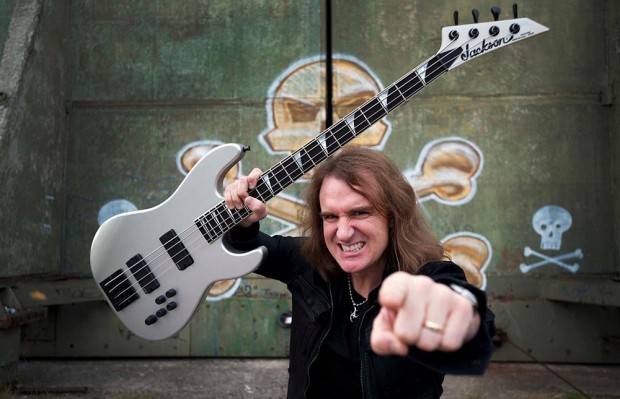
For nearly 30 years, David Ellefson has been a dominating force in the world of metal bass. As a founding member of Megadeth, he’s toured the world, been nominated for 7 Grammys, and has continued to inspire the bass community. His Rock Shop series of instructional videos on YouTube has been an informative ride for musicians around the globe as he discusses various aspects of the music industry. Ellefson recently launched the David Ellefson Rock Shop App, a bass and guitar amp for iOS devices made by Pocketlabworks. (Check out our review of the app).
Besides his new app, the bassist has released a book of lyrics and is getting ready to launch a new bass design with Jackson, not to mention the fact that he spends many of his days on the road with Megadeth. We got in touch with Ellefson to find out about the app, his first recording experience with Megadeth since reuniting with them in 2010, and how he gets his signature tone.
You’re getting ready to go back out on tour with Megadeth for a new leg of the tour supporting Th1rt3en, which was your first album since rejoining the band. Was that recording experience like a homecoming for you?
Yea it was, [but] in a lot of different ways, though. I think my time away from the band thrust me into a different professional experience by sort of being a “hired gun” kind of bass player for a lot of situations like recording and touring for a lot of different people, as well as putting my own bands together. I think those experiences, when I came back to Megadeth, made me approach my old gig in a much more professional manner. And that was good, because the dynamics of how the band works are a lot different now than how they used to be. It used to be that we all lived in the same city, we’d get together for a couple months and write some songs, then we’d make some demos, then we’d secure a producer, and then we’d go in a start making a record. That process doesn’t exist partly because record budgets aren’t there to do that, and I think also over the years we learned to streamline it so we can be more efficient. With Megadeth, we’re kind of constantly always on tour at this point, so to take excessive time off the road to go in and cut records like we used to earlier in our career… we just don’t have that kind of luxury anymore. Nor do we really want to take that time off, because we already know what works, and we certainly know what doesn’t work, so part of the learning curve is how to streamline the operation so that we can be musically as productive as we can and write the best songs that we can write.
You keep busy with touring, but really it seems like you keep busy with everything! You just had the David Ellefson Rock Shop released. How did that come about?
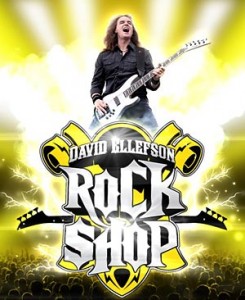 Kevin [Robertson] sent me his iRiffPort, which is made by his company Pocketlabworks. Along with it came the software, which was just a simple interface to plug a guitar or a bass into it. One of the features that I liked was the ability to access your iTunes library from inside the app. So I spoke with him back in early January. You know, I’d been approached by a few people about doing an app, but there was never really a focus to it. So I called Kevin and talked to him. Right away we clicked on the ideas. He really loves my whole Rock Shop concept. He loves the videos that I put online talking about education of the music business, and some of the teaching and instructional video stuff I put online. So for the Rock Shop App, what he liked was creating an app where you could not only access your iTunes library, but also you could go to YouTube and bring those videos inside the app.
Kevin [Robertson] sent me his iRiffPort, which is made by his company Pocketlabworks. Along with it came the software, which was just a simple interface to plug a guitar or a bass into it. One of the features that I liked was the ability to access your iTunes library from inside the app. So I spoke with him back in early January. You know, I’d been approached by a few people about doing an app, but there was never really a focus to it. So I called Kevin and talked to him. Right away we clicked on the ideas. He really loves my whole Rock Shop concept. He loves the videos that I put online talking about education of the music business, and some of the teaching and instructional video stuff I put online. So for the Rock Shop App, what he liked was creating an app where you could not only access your iTunes library, but also you could go to YouTube and bring those videos inside the app.
One of the things I wanted to do was make sure it was available not only for bass players, but especially for guitar players. [As] bass players, we’re the minority on the stage [laughs]. So, I thought that this is something that needs to be open for both guitar and bass players offering a variety of tones, because not everyone plays metal. So really, as we discussed it, it went from being this fun little app to really becoming a full-on, professional-level mobile practice studio. It’s almost like a digital workstation of sorts, which is kind of the bigger picture goal that we’re aiming at with this.
So are you typically kind of a techie guy? Do you get into new technology easily?
No. I like to hit the button, and it had better work! [laughs] If it doesn’t, I lose interest and move on, you know? I think that’s the good dynamic between me as the end user/artist and working with someone like [engineer Kevin Robertson] at Pocketlabworks because that’s the side of the business they know, and they’re really into it.
As I understand, Kevin had a history with GK amps, so he actually knows it from a musical side, and he’s also a guitar player, so he’s not just approaching it from the tech geek side, he’s approaching it from the guitar player/tech geek, you know? I’m approaching it from artist/end user, so it’s like we’ve kind of got all our bases covered.
In a lot of these things, there has to be partnership. It’s just like being in a band, or being a songwriting team. There has to be partnership, and what makes it cool is that everyone brings something different to the table. It’s really been a fun process putting this app together, pinging ideas back and forth. With everything, you don’t want just to build it so that it’s closed up and done. Especially in the tech world, you always want to be aiming for [versions] 2.0 and 4.0, because our industry is developing, the technology is developing, and even as an artist one day I’ll find I have the need for something and I want to put that need into that app for future releases.
Can you give us a rundown of the gear you use?
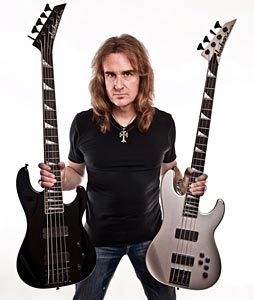 Currently for touring, I use my Jackson. It’s a Signature Series Concert bass. [I have] a four and a five-string in both silver and black. I have a 35? scale one that’s red, so if anyone sees me playing that, it’s actually a 35? scale, which helps the low B string sing a little bit cleaner and a little bit clearer than a 34? scale.
Currently for touring, I use my Jackson. It’s a Signature Series Concert bass. [I have] a four and a five-string in both silver and black. I have a 35? scale one that’s red, so if anyone sees me playing that, it’s actually a 35? scale, which helps the low B string sing a little bit cleaner and a little bit clearer than a 34? scale.
Other than that, it’s pretty straight ahead – I plug in through a Digitech Stereo Chorus, and I only use that on a couple songs like “Dawn Patrol”, and “Poison Was the Cure”. Otherwise, my tone is straight in with no effects.
I have a Peterson rack mount Strobotuner, and other than that it’s straight into the Hartke LH-1000 heads. I use two of those because on the left side of the stage I power two Hartke Hydrive 8×10 cabinets, and on the right side of the stage I power two 8×10 cabinets as well. It’s pretty streamlined and really simple.
I use Shure wireless systems, but I like it to be simple [so] if need be, I can plug a cable straight into the amp. My rig is really very simple and streamlined. I like the tone to come from my hands, not from the gear.
That’s one of the things everyone wants to know, because they love your tone. So you say it’s in the hands?
Very much so. I think as a young, developing bass player, I really paid attention to learning how to get up on the fingertips. Instead of doing the thing with your thumb over the neck, I got behind the neck and really got precise as a player. The less skin you have touching the string, the more clear and precise the note is. By playing with a pick, which I really only did because I couldn’t afford to buy big huge amplifiers to be louder than the guitar players [laughs], I had to use every trick in the book as my defense against guitar players. But by playing with a pick, it gave me a really clean, clear tone. That also allows me in Megadeth to play the fast licks. I can also do a lot of palm muting back on the bridge if I need to hunker down and mute with the guitar patterns. It allows me to really integrate with the guitars, and when need be, really step aside and have a distinct sound as a bass player.
What do you think makes a great bass player?
You know, there’s two types of bass players. There’s artists and there’s sidemen. I tend to kind of be a little bit of both. Early on in my formative years, I was a big fan of rock and roll and hard rock and eventually heavy metal when I got turned on to it. Everything from Aerosmith, KISS, Ted Nugent, kind of ’70s American rock and roll I grew up with.
And then of course I got into Iron Maiden and Rush, with very progressive bass players. It’s interesting because Gene Simmons, Steve Harris and Geddy Lee are all artist bass players. You know, they’re songwriters as well as bass players. Another great artist bass player is Bob Daisley, who played on the first two Ozzy [Osbourne] records and on Rainbow, Long Live Rock and Roll… Again, just a great songwriter bass player.
Same with Geezer Butler, another great songwriter, artist bass player. What’s funny is all those guys are also really good lyricists, and I think what that does is when you’re not only thinking from the bass point of view, you’re thinking from sort of the bottom of the tune as you build it from the bottom up, but you’re also thinking melodically on the top of it. You’re thinking about singers and how a vocalist is going to sing and how to phrase words into melodies. Lyric writing is a whole other part of our craft as well. I really like that side of it, which is why I’ve put several of my own bands together, like F5, because I wanted to continue to have a creative outlet.
On this other side of that is sort of the sideman bass player, which requires a whole other skill level, most predominately being versatility. That bass player needs to be really quick on his toes. He needs to be musically very astute, be able to read and understand chord charts, and be able to read manuscript and notations. [These players] also have to have a very good ear. In fact, that’s what I’m going through as I learn the songs for this clinic this week, because I’m having to learn a lot of other people’s songs, which is something I haven’t really had to do for about a year. It’s actually kind of stretching my brain to get back into that mindset again, because I can’t go up there and play like an artist. I have to emulate how another bass player played. I don’t hold with those who think cover musicians are subpar musicians. I think cover musicians are some of the most astute musicians on the planet because of their ability to emulate what other people may have played or, in the case of a session bass player, be able to come in and create something on the spot. The recording bass player is kind of a whole other side to the sideman bass player. In any case, a bass player has to have great tone and great timing.
How often do you practice, and what kind of things do you work on?
My practicing is usually very focused on the task at hand. For instance, I’ve got an event coming up, so I’m practicing those songs for that event. When that’s done, I’m going to come home and start practicing songs for the Megadeth show. That’s going to include introducing two new songs, so I need to brush up on those. Some of the others are just a matter of refreshing my mind. I’m a bit on autopilot because I play them so much. Being on autopilot is good, because that’s what makes you a good entertainer. When Megadeth performs, it’s entertainment. When we’re in the studio, it’s about creating. If I’m going into the studio, I’m in creation mode, and I’m creating bass lines and I’m doing a lot of listening to what the other people are playing so that I can craft bass lines that work well and kind of glue the whole ensemble together. That’s a big part of how I see the role of the bass player, especially in a metal band. The guitars and the drums are essentially the foundation blocks that define the song, so I look at my role as being the glue in between the bricks that glues the whole thing together.
Speaking of the creative side, you just released your book Unsung a little while ago.
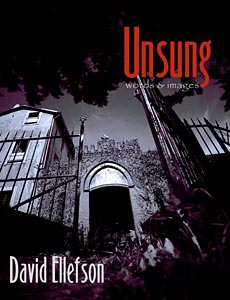 Yeah. I put it together with the idea that you have a lyric and a photo to accompany it in the same way that you would have a lyric that would be part of a song. I chose to use photograph images instead of a song. How the book came about is back in December, I was looking through a file on my computer and it had all these lyrics. A lot of it I had just written recently. I thought, “You know, I don’t know what I’m going to do with these. I’m on a world tour for a year without time to really write music around this stuff.” A friend of mine here in town writes some poetry and was actually helping me cowrite and clean up a couple of lyrics for me. I spoke with him, and he helped me put the team together with my editor Libby over in London, and Rafaela, whose photographs we used to accompany the lyrics in the book.
Yeah. I put it together with the idea that you have a lyric and a photo to accompany it in the same way that you would have a lyric that would be part of a song. I chose to use photograph images instead of a song. How the book came about is back in December, I was looking through a file on my computer and it had all these lyrics. A lot of it I had just written recently. I thought, “You know, I don’t know what I’m going to do with these. I’m on a world tour for a year without time to really write music around this stuff.” A friend of mine here in town writes some poetry and was actually helping me cowrite and clean up a couple of lyrics for me. I spoke with him, and he helped me put the team together with my editor Libby over in London, and Rafaela, whose photographs we used to accompany the lyrics in the book.
All of the sudden we had a team together and we started laying the book out. We decided to just do the self publishing route, knowing that the sales numbers weren’t going to be as big doing it like that, but it was more about a fun little creative project and a way to put the lyrics out. Also, I left the door open that if any readers ever wanted to use them with their songs, that I would be open to letting that happen. After we laid the book out, it was like, “Now I see an album in front of me.” [laughs]
Lots of times you write music and say, “Ok, I’ve gotta get some lyrics to this music,” but this was approaching it from the opposite direction [by] laying lyrics out and realizing, “Ok, now I have a much better scope of what it would take to actually write some music to this stuff.”
I saw the YouTube video of you reciting “Manuscriptum Regius.” Are we going to be seeing more of that?
I think so, because what I realized with the book is that it opened up the spoken word side of things, which I didn’t know that much about before. I knew of it, but I’ve never really had much experience [with it]. It was funny, because as I was writing the book, people started sending me spoken word YouTube videos, and some were really cool ones. There were some religious based, there was a rapper who had done kind of a spoken word in a rap cadence. So these things were very modern and very contemporary.
I always thought spoken word was like a poet sitting in a coffee house reading something, which didn’t really excite me. But then I saw these other people doing it in a hip, contemporary fashion and that’s actually what inspired me to make that video. I thought maybe the first “single” will be this really dark heavy thing, because I think my fans would associate that with me. It’s a lyric I really love, and it’s actually the first lyric that I wrote for the book long before I knew this was going to be a book. It’s the thing that tied me and my cowriter Brent Nelson together. He wrote a book called Out of Darkness. [It’s] kind of a similar thing, and it’s got a lot of these really dark, pensive poems and stuff in it. It’s really like a metal album. It’s just kind of fun to cowrite lyrics with someone. And he’s an MD… he’s a doctor. That’s his day job. I realize this too – I’ve played with a lot of musicians over the years, and just because some people were never able to pursue being a professional musician, it’s amazing the talent that is outside of even the professional realm. Getting a record deal and all that, you know, you kind of have to be at the right place at the right time and the right thing at the right time and the right person at a label becomes your cheerleader and believes in you and convinces somebody up above to start spending money on you… It’s such a calculated process that either all lines up or none of it lines up. So I’ve enjoyed over the years getting to play with some musicians and working with someone like Brent who has just got such a great lyrical talent. Again, it pushed me into a mindset to be able to put a book together. You never know where inspiration is going to come from is the moral of the story.
You’ve got the Jackson David Ellefson Signature basses, but the last video I watched had you talking about a T-bird styled bass. What’s going on with that?
Yeah, the Kelly Bird. Right now we’re actually working on the production of those basses. We’ve got the design done and it seems fans and musicians want to buy that, so we’re moving forward with the production. Those things are usually four to six months out from when they actually cut down the tree to when it shows up in your music store. So anyway, I’m thinking sometime later this year. Winter NAMM 2013 at the latest.
I had a bass like that which Jackson had made for me back in 1992, when we were on the “Countdown to Extinction” tour. I just wanted this rock and roll looking bass, and of course you’ve gotta be sure that you don’t infringe on someone else’s design, so what we did is we took the elements of this classic look of a bass, then Jackson has a guitar called the Kelly, which is Kelly Rhoads, who was [late guitarist] Randy’s brother. When they did a guitar for Randy they did one for Kelly, and this one was called “the Kelly”. It has this kind of cool horn down on the bottom that kind of curves down and has this cool hook on it. So to make sure we don’t infringe on anyone’s copyright, but to recreate a bass I loved back 20 years ago, and again to bring the past forward.
That’s kind of a big part of what we’re doing in Megadeth. We’re kind of bringing our past forward and that’s largely because a lot of our fans have stayed with us all these years and we’re trying to keep things true for them. Also, it’s a way to introduce a lot of the young new fans who have started to hear about Megadeth on the radio and video games and all that stuff. It’s a way to take them down an avenue that they never got to experience the first time.
That’s like the “Rust In Peace” 20th anniversary tour, last year we put out a box set of the 25th anniversary of the Peace Sells… But Who’s Buying? album. So we’re in kind of a fun phase of the band right now that we can do this stuff because we’ve got this very wide age spread.
Back to your question specifically about that bass, it allowed me to bring the past forward but still create something new. That’s the other side of this… Megadeth is still a viable band that can write and create and invent new things. New music, new guitar styles, new imagery.
So we don’t just have to go back and rest on our past laurels either.

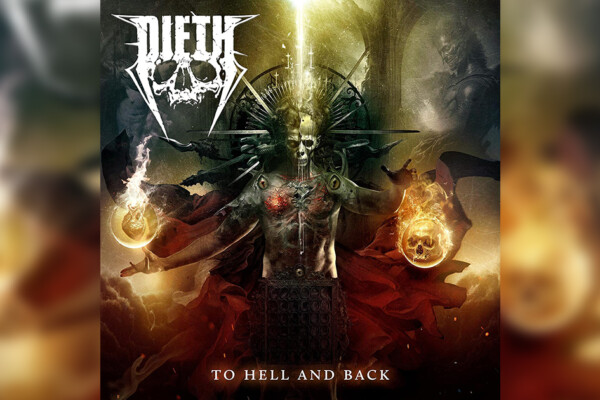
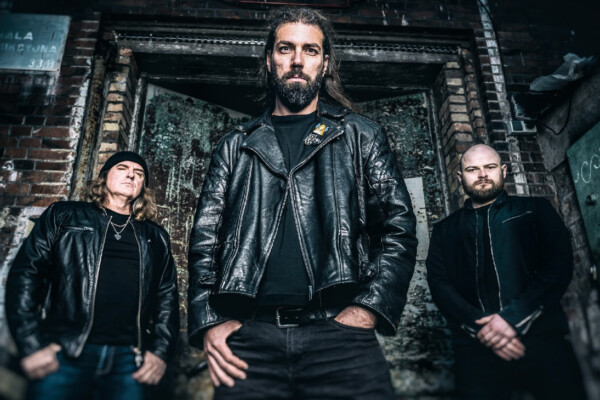
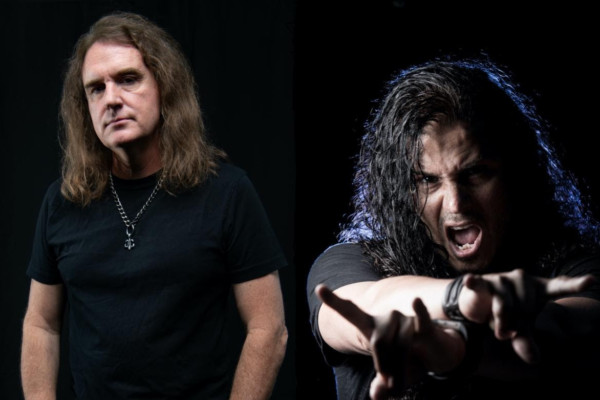
I’d have more respect for him if Th1rte3n wasn’t such a collosal piece of shit lyrically. Mustaine needs to stop it with the Holy Roller shit and write some gritty stuff again.